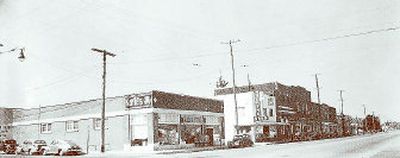On Sprague Avenue, progress is give and take

If you bought a cat in 1988 and managed to keep it alive through the Clinton presidency, you did better than HomeBase, which opened a 50,000-square foot home improvement store in Spokane Valley only to fold in early 2001.
The mega-retailer’s mega-carcass, which has been sitting empty at the corner of Sprague Avenue and Farr Road ever since, goes up for auction May 11 to satisfy a $5.8 million debt.
If you skipped the cat and bought a hamster 10 years later in 1998 and managed to keep it alive more than five years, you’re one up on Rite Aid. The drugstore chain that opened shop in the above-mentioned year at the corner of Sprague Avenue and Sullivan Road pulled out in 2003.
Even in pet years, nothing lasts a long time on Sprague Avenue, which is why Dave Arnold isn’t too upset about his landlord’s plans to take a wrecking ball to Arnold’s Army Surplus store at the corner of Sprague and Pines Road.
“It’s time for it to go bye-bye,” Arnold said. “It’s an old building and people get nostalgic about old buildings. But you know, my landlord has been an awesome landlord and I don’t have any complaints.”
The building is nearly 100 years old, the original home of Opportunity Bank. The bank’s vault still exists in Arnold’s basement, though its thick steel door was already gone 23 years ago when Arnold’s father started selling camouflage gear there.
Army Surplus is being cleared out to make room for bigger things – more specifically, a Rite Aid.
However, Arnold isn’t reaching for his Gulf War era Kevlar helmet just yet. Developers working on behalf of Arnold’s landlords, Tom Hamilton and David Thompson, have just begun meeting with city planners. They’ve only asked the city if the alley behind the buildings can be moved to accommodate their project.
Three other two-story brick buildings besides Arnold’s 12218 E Sprague address will be going, too, according to the city, if the project proceeds. No one has suggested saving the buildings, but there is, as Arnold suggested, a degree of nostalgia attached to them.
The southwest corner of Sprague and Pines is one of the few places in Spokane Valley that actually looks like a downtown, with parking in the rear and brick buildings that open right up onto the sidewalk. There are tiny details in the brickwork that just aren’t found in the beige cubes of chain retail.
This is a block dominated by venerable family-owned businesses such as Peters Hardware and Dave’s Bar and Grill, places where the owners don aprons and work alongside everyone else. And it’s also a block whose fate isn’t decided by a single business. Dave’s and Peters, which own their buildings, aren’t going anywhere. Mixed ownership has helped the block weather some tough times.
In 2003, the block lost one of its family businesses when fire tore through one of the properties now being eyed for development. The smoke damage prompted Midway Cyclery, a family-owned Schwinn shop established in 1958, to close. Nothing ever replaced it. Hamilton, who was unavailable for comment for this column, proved how diverse the older buildings could be by using one for the Valley Repertory Theater. He once mentioned bringing back living quarters to the buildings’ second floors, which included apartments long ago.
Later Hamilton made space for the Spokane Dream Center’s Christian youth group. In Midway Cyclery’s former space, among the piles of abandoned old bicycles in various stages of repair, is a giant butcher paper poster thanking the landlord on the Dream Center’s behalf for his generosity; it is not a giant rent check.
The block’s patrons are somewhat aware of the changes to come. Fastened to a utility pole in the alley behind Dave’s Bar, there’s a notice informing the public of the request to relocate part of the alley.
With no street parking available, the alley is where these businesses co-exist. It smells like cigarette butts and the blue exhaust of delivery trucks. It smells of hot grease and stale beer, of patchouli wafting from a nearby shop selling smoking accessories. The accessories, it should be noted, are clearly marked “for tobacco use only.”
There’s a denture shop at the alley’s west end as well as the only community repository for local artifacts, the Spokane Valley Heritage Museum.
It’s the museum that’s perhaps most interested in what happens to the buildings on the block’s east end. Because this is where Spokane Valley’s past comes to rest.
“Progress is a double-edged sword,” said Jayne Singleton, the museum’s director, whose collection includes bits and pieces of many razed buildings.
There’s a small scrap of wood siding from an old grade school torn down 38 years ago for retail development and a single brick from an old high school. Leaning against the wall is a paint-peeled vent from a fruit-packing warehouse back when apple orchards were king.
Singleton said she had to run in and grab the vent just as the warehouse was being destroyed. She’s hoping she’ll get a cornerstone from the buildings on the west end of her own block with less trouble.